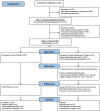Effectiveness of Disease-Specific Cognitive Behavioral Therapy on Anxiety, Depression, and Quality of Life in Youth With Inflammatory Bowel Disease: A Randomized Controlled Trial
- PMID: 29850915
- PMCID: PMC6147749
- DOI: 10.1093/jpepsy/jsy029
Effectiveness of Disease-Specific Cognitive Behavioral Therapy on Anxiety, Depression, and Quality of Life in Youth With Inflammatory Bowel Disease: A Randomized Controlled Trial
Erratum in
-
Corrigendum.J Pediatr Psychol. 2020 Aug 1;45(7):825. doi: 10.1093/jpepsy/jsy098. J Pediatr Psychol. 2020. PMID: 30500914 Free PMC article. No abstract available.
Abstract
Objective: To evaluate the effectiveness of a disease-specific cognitive behavioral therapy (CBT) protocol on anxiety and depressive symptoms and health-related quality of life (HRQOL) in adolescents and young adults with inflammatory bowel disease (IBD).
Method: A parallel group randomized controlled trial was conducted in 6 centers of (pediatric) gastroenterology. Included were 70 patients and young adults (10-25 years) with IBD and subclinical anxiety and/or depressive symptoms. Patients were randomized into 2 groups, stratified by center: (a) standard medical care (care-as-usual [CAU]) plus disease-specific manualized CBT (Primary and Secondary Control Enhancement Training for Physical Illness; PASCET-PI), with 10 weekly sessions, 3 parent sessions, and 3 booster sessions (n = 37), or (b) CAU only (n = 33). Primary analysis concerned the reliable change in anxiety and depressive symptoms after 3 months (immediate posttreatment assessment). Exploratory analyses concerned (1) the course of anxiety and depressive symptoms and HRQOL in subgroups based on age, and (2) the influence of age, gender, and disease type on the effect of the PASCET-PI.
Results: Overall, all participants improved significantly in their anxiety and depressive symptoms and HRQOL, regardless of group, age, gender, and disease type. Primary chi-square tests and exploratory linear mixed models showed no difference in outcomes between the PASCET-PI (n = 35) and the CAU group (n = 33).
Conclusions: In youth with IBD and subclinical anxiety and/or depressive symptoms, preliminary results of immediate post-treatment assessment indicated that a disease-specific CBT added to standard medical care did not perform better than standard medical care in improving psychological symptoms or HRQOL. ClinicalTrials.gov: NCT02265588.
References
-
- Alexakis C., Kumar S., Saxena S., Pollok R. (2017). Systematic review and meta-analysis: The impact of a depressive state on disease course in adult inflammatory bowel disease. Alimentary Pharmacology and Therapeutics, 46, 225–235. - PubMed
-
- Arrindell W. A. (2001). Changes in waiting-list patients over time: Data on some commonly-used measures. Beware!. Behaviour Research and Therapy, 39, 1227–1247. - PubMed
-
- Axelson D. A., Birmaher B. (2001). Relation between anxiety and depressive disorders in childhood and adolescence. Depression and Anxiety, 14, 67–78. - PubMed
-
- Bennebroek Evertsz F., Sprangers M. A. G., Sitnikova K., Stokkers P. C. F., Ponsioen C. Y., Bartelsman J. F. W. M., van Bodegraven A. A., Fischer S., Depla A. C. T. M., Mallant R. C., Sanderman R., Burger H., Bockting C. L. H. (2017). Effectiveness of cognitive-behavioral therapy on quality of life, anxiety, and depressive symptoms among patients with inflammatory bowel disease: A multicenter randomized controlled trial. Journal of Consulting and Clinical Psychology, 85, 918–925. - PubMed
Publication types
MeSH terms
Associated data
LinkOut - more resources
Full Text Sources
Other Literature Sources
Medical
Research Materials
Miscellaneous


